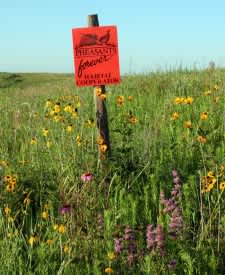Pheasants Forever Awarded Outdoor Heritage Grant to Boost 1,250 acres for N.D. Birds & Bees
Pheasants Forever 05.30.14

The North Dakota Industrial Commission has awarded a $173,750 grant to Pheasants Forever from the state’s Outdoor Heritage Fund. Pheasants Forever and the Natural Resources Conservation Service will utilize the grant to upgrade 1,250 acres of upland habitat for pheasants, sharp-tailed grouse, pollinating insects and other wildlife.
One of 17 projects awarded by the North Dakota Industrial Commission in its second round of Outdoor Heritage Fund grants, Pheasants Forever’s “North Dakota Pollinator Partnership” project will restore or enhance 1,250 acres of privately-owned land, improving the quality of upland habitat via the USDA’s Wetlands Reserve Program (WRP). Of this total, 1,000 acres will be new WRP tracts being converted from cropland to upland habitat and 250 acres of land being converted from brome grass to high-diversity prairie habitat. Pheasants Forever and the Natural Resources Conservation Service will key in on priority areas near existing prairie habitat or tracts already enrolled in the state’s Private Lands Open to Sportsmen (PLOTS) program as well as areas located near apiaries.
“Not only has North Dakota been a consistent top-tier pheasant state, it’s also the number one honey producing state, by a 2-to-1 margin,” says Matt Olson, Pheasants Forever’s regional representative in North Dakota, “A successful pheasant hatch and a banner honey harvest aren’t mutually exclusive – they both require upland habitat. Growing the flowering plants bees depend on creates the exact same habitat pheasant broods need to survive. In fact, pheasant chicks feast primarily on insects during the first weeks of their lives. Ultimately, the purpose of this project is to increase the flowering plant diversity for the benefit of upland birds and native pollinating insects.”
“I applaud the efforts of Pheasants Forever in working to increase pollinator habitat. It is exactly this kind of effort that will help keep North Dakota’s traditions of beekeeping and honey production intact for the future,” reported Zac Browning, a North Dakota bee keeper.
“The Outdoor Heritage Grant awarded to Pheasants Forever is a perfect blend of local, state and federal entities partnering to assist farmers and ranchers who utilize voluntary conservation programs for the benefit of North Dakota’s natural resources,” said Mary Podoll, NRCS State Conservationist. “It’s exciting to offer producers the opportunity to enhance wildlife and pollinator habitat.”
There has been a sharp decline in the quantity of upland habitat in North Dakota in recent years due to reductions in Conservation Reserve Program acreage (a decline of more than 1.5 million acres) and the conversion of native prairies to cropland. Olson says projects funded through the state’s Outdoor Heritage Fund, which was established in 2013, are a positive first step in restoring some of what’s been lost, and a way to preserve North Dakota’s outdoor traditions for generations to come. “We’re thankful to the Industrial Commission for recognizing and approving this significant Pheasants Forever project.”
To see Pheasants Forever’s full “North Dakota Pollinator Partnership” proposal, click here.

